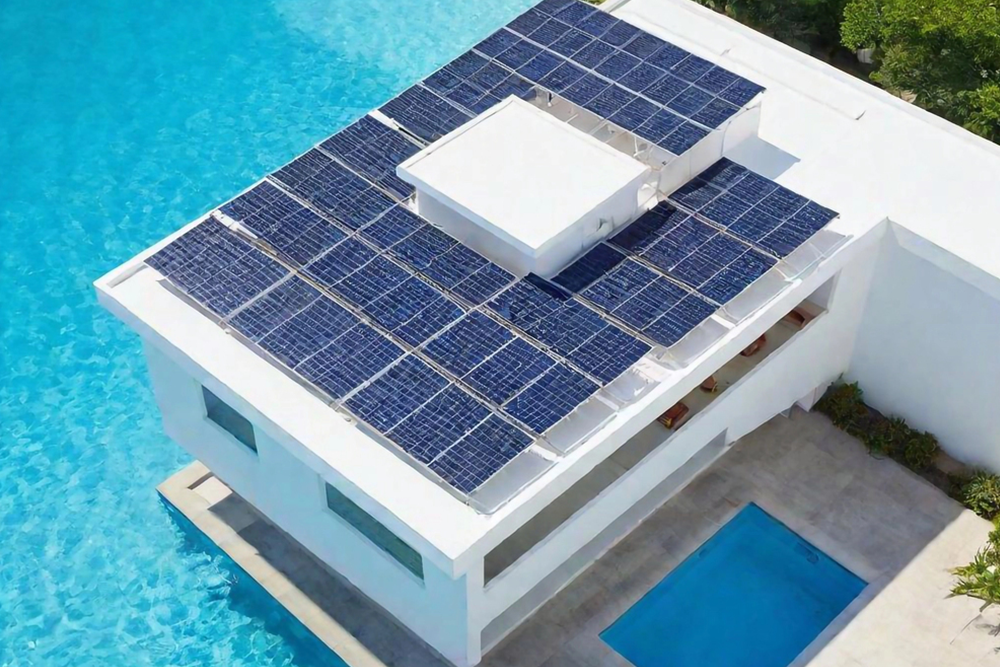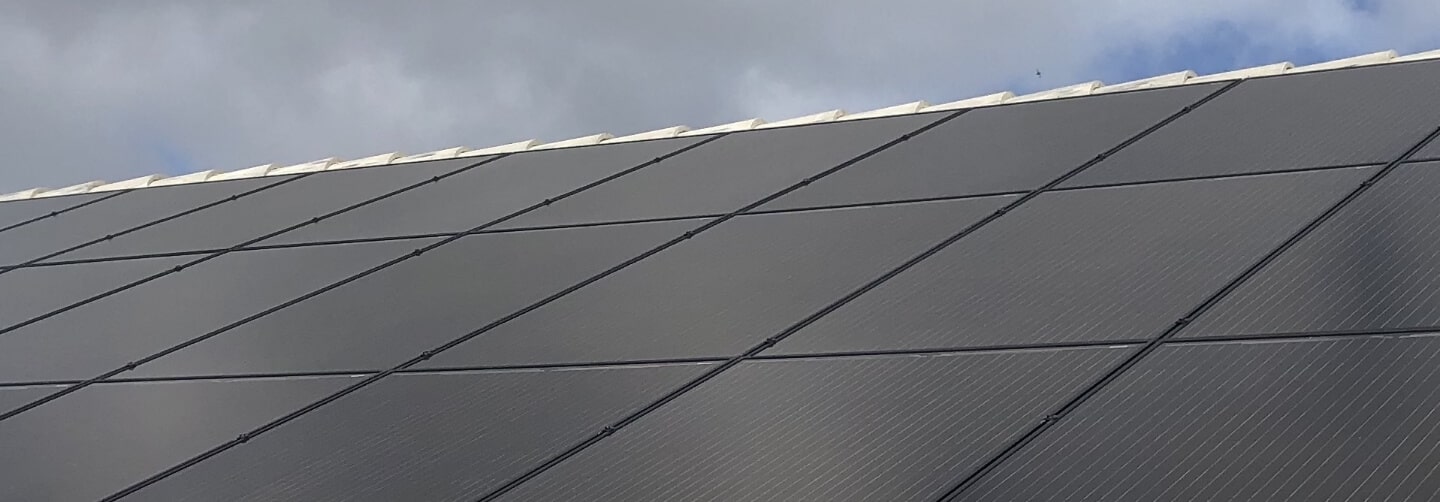Swimming Pool Solar Panels Buying Guide

In Florida, long sunny days create the perfect conditions for extending swimming seasons. Homeowners now use this sunshine for more than lighting and warmth. Many install residential solar panels in Florida to heat pools, reduce energy bills, and maintain comfort without constant utility costs.
The demand for Florida solar panels is growing as families seek efficient ways to enjoy outdoor living. Installing solar panels in Florida for pools is both a sustainable and practical choice, blending climate advantages with modern technology.
How Solar Pool Heating Works
Solar pool heating uses a straightforward system. Water is pumped from the pool through a filter and into solar collectors. These collectors, often roof-mounted, absorb the sun’s energy and transfer heat to the water. The warmed water then flows back into the pool.
A key feature of this process is its reliance on natural sunlight, which reduces operational costs. No gas burners or electric heaters are involved during regular use. The system’s performance depends on collector placement, orientation, and size.
Solar pool heating also includes a control valve. This allows pool owners to regulate temperature based on preference or seasonal changes. During cooler months, a solar blanket can help retain heat overnight, making the system more effective.
For those interested in broader home energy savings, combining a pool heating setup with solar electric systems can create a unified approach to energy efficiency.
Benefits of Solar Pool Panels for Florida Homes
- Longer Swimming Seasons
Florida pools are warm in summer but can cool quickly during spring and fall. Solar heating keeps water at a comfortable temperature for more months each year.
- Lower Energy Bills
Traditional pool heaters rely on gas or electricity. Both add recurring costs. Solar pool systems use sunlight, which means less dependency on grid energy and reduced monthly expenses.
- Low Maintenance
Once installed, solar pool heaters need minimal upkeep. The collectors have no moving parts, reducing the chance of breakdowns. Occasional cleaning and seasonal checks are often enough.
- Eco-Friendly Operation
Solar heating does not emit greenhouse gases during operation. This makes it a clean option for homeowners who value environmental responsibility.
- High Return on Investment
While installation has an upfront cost, the savings on energy bills over time can offset this expense. The long lifespan of solar pool panels further supports cost-effectiveness.
Choosing the Right Solar Pool Panels
- Assessing Your Pool’s Size and Usage
The number of panels you need depends on pool size, desired temperature, and swimming frequency. A larger pool or year-round use may require more collectors.
- Roof Space and Orientation
The roof’s direction affects sunlight exposure. In Florida, south-facing installations often yield the highest efficiency. Roof space should match the number of panels required for optimal heating.
- Panel Material
Solar pool panels are typically made of polypropylene or rubber. Polypropylene panels are durable and resist chemical damage. Rubber panels are flexible and suitable for certain roof types.
- Durability in Florida’s Climate
Florida weather can be intense. Look for panels that handle strong sun, heavy rain, and occasional storms. UV-resistant coatings help extend lifespan.
- Warranty and Lifespan
Reputable manufacturers offer warranties ranging from 10-15 years. A strong warranty signals confidence in the product’s quality.
Cost Considerations
- Upfront Investment
Solar pool heating systems generally cost less than full-home solar electric setups. The total price varies based on panel quantity, roof preparation, and installation complexity.
- Operating Costs
Since solar pool heaters use existing pool pumps, ongoing costs are low. Any extra expense usually comes from minor maintenance or seasonal adjustments.
- Potential Incentives
Florida does not have a statewide rebate program for solar pool heaters, but certain counties or utility providers offer promotions. Federal incentives for renewable energy often apply to solar electric, but may not extend to pool heating.
- Payback Timeline
Many homeowners see a return on their investment within a few years. The more you use your pool outside of peak summer, the faster the savings accumulate.
Performance Factors to Keep in Mind
- Collector Size
The collector area should be at least 50 to 100 percent of the pool’s surface area. This range varies depending on the desired temperature and seasonal use.
- Pump Efficiency
An energy-efficient pump helps circulate water through the collectors without adding significant electricity costs.
- Water Flow Rate
A steady flow rate allows water to absorb heat evenly. If the flow is too fast, the water will not warm sufficiently. Too slow, and heat loss may occur before it returns to the pool.
- Temperature Control Systems
Automated controllers can adjust water flow based on sunlight levels and current pool temperature. This keeps heating consistent without manual oversight.
Installation Process
- Site Evaluation
The process begins with assessing the pool’s location, available roof space, and exposure to sunlight. Installers also check structural integrity to handle panel weight.
- System Design
Based on the evaluation, the installer recommends panel size, quantity, and placement. They also determine plumbing routes for connecting the system to your pool pump.
- Mounting the Panels
Panels are typically mounted on the roof, though ground mounts are an option if space and sunlight are adequate.
- Plumbing and Controls
Pipes connect the pool pump to the solar collectors, directing water for heating. A control valve or automated system manages water flow.
- Testing and Adjustment
Once installed, the system is tested for leaks, proper flow rate, and heating performance. Adjustments fine-tune the setup for maximum efficiency.
Maintenance and Care for Pool Solar Panels
Once swimming pool solar panels are installed, proper upkeep is important for maintaining efficiency and performance. Dirt, leaves, and debris can accumulate over time. These block sunlight and reduce heat output. Routine cleaning can help the system operate as intended. In most cases, rinsing the panels with a garden hose works well. If the buildup is heavier, soft brushes and mild, non-abrasive cleaning agents are safe to use.
Monitoring water flow is another part of ongoing care. Pool solar panels require consistent water circulation to function effectively. Inspecting the pump and filter regularly will help prevent clogs. When water flow decreases, it can cause uneven heating or system strain.
Seasonal considerations also matter in Florida’s climate. While winters are mild, occasional cold fronts can still occur. Some homeowners choose to temporarily bypass their solar panels during extended cool periods to prevent unnecessary wear. Modern systems often have built-in valves to make this process simple.
Professional inspections can be scheduled annually to check for leaks, cracks, or loose connections. A solar installer familiar with pool systems can also confirm the panels are still aligned for optimal sunlight exposure. This can extend the lifespan of the system significantly.
Costs and Return on Investment
The price of swimming pool solar panels varies based on pool size, the number of panels, and the installation process. For many Florida homeowners, the initial investment is offset by reduced electricity or gas bills. Once the system is operational, sunlight is free to use, which means lower ongoing costs for pool heating.
In Southwest Florida, the pool season can stretch across most of the year. This maximizes the value of solar pool heating compared to areas with shorter warm seasons. With proper care, solar pool panels can last over a decade, often making the total savings higher than the upfront expense.
When calculating return on investment, it is helpful to consider both energy cost savings and extended swimming time. Heated pools often see more frequent use, especially during early spring and late fall. For families who use their pool often, the added comfort can be worth as much as the financial return.
Some Florida residents also install solar electric systems alongside pool heating. This approach allows a home to generate power for both household needs and pool equipment. Bundling installations can sometimes reduce costs and improve overall efficiency.
Environmental Benefits of Pool Solar Heating
Switching to solar pool heating also reduces environmental impact. Traditional pool heating systems often run on electricity or natural gas, both of which come with higher carbon emissions. Solar panels, by contrast, use a renewable energy source without producing greenhouse gases during operation.
In regions like Florida, where sunlight is abundant, solar pool panels operate with minimal strain on resources. This means heating a pool can be more sustainable without sacrificing comfort. Many homeowners find this aspect appealing, especially as awareness of energy conservation grows.
By using solar services tailored to Florida’s climate, pool owners can achieve reliable heating while supporting cleaner energy choices. Over the lifespan of the panels, the reduction in energy use adds up to a meaningful environmental contribution.
Make the Most of Florida’s Sunshine
Swimming pool solar panels are an investment in both comfort and sustainability. Florida’s abundant sunlight makes it one of the best regions for maximizing solar energy use. By choosing the right system, maintaining it properly, and avoiding common mistakes, homeowners can enjoy extended swimming seasons and lower heating costs.
If you are ready to explore solar pool heating for your home, our team at Solar Energy Solutions of America specializes in systems built for Florida’s climate. We design, install, and service pool solar panels with a focus on performance and long-term value.
Contact us today to learn how we can help you enjoy your pool more months of the year while reducing energy expenses.
